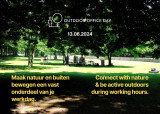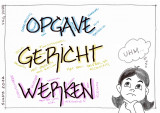In the big tech-dominated era, data has been commercially exploited for so long that it is now hard to imagine that data sharing might also benefit the community. Yet that is what a collective of businesses, governments, social institutions and residents in Amsterdam aim to do with the Data Commons Collective. Sharing more data to better care for the Amsterdam Region. On Demoday #23, Lia Hsu (Amsterdam Economic Board) and Simone van der Burg (Waag) led an interactive value workshop to discuss which values are important when it comes to sharing data from the perspective of different stakeholders in an (agri)food use case.
What is a (Data) Common?
Commons are natural resources that are accessible to everyone within a community. Water. Fertile soil. Clean air. Actually, everything the earth has given us. We as humanity have increasingly begun to exploit these commons in our pursuit of power and profit maximisation. As a result, we risk exhausting them.
Data is a new, digital resource: a valuable commodity that can be used to improve products and services. Data can thus also be used for the common good. However, there are two important differences between a common and a data common: data in commons never run out, and data in commons is not tied to any geographical location or sociocultural groups.
Four principles for Data Commons
Each Data Common serves a different purpose and requires a different implementation, but there are four principles that are always the same:
- The data common is used to serve a public or community purpose;
- The data common requires cooperation between different parties, such as individuals, companies or public institutions;
- The data common is managed according to principles that are acceptable to users and that define who may access the data commons under what conditions, in what ways they may be used, for what purpose, what is meant by data misuse;
- The data common is embedded to manage data quality, but also to monitor compliance with the principles and ensure that data misuse is also noticed and that an appropriate response (such as a reprimand, penalty or fine) follows.
The (Agri)Food case
The Data Commons collective is currently working on different applied use cases to understand how Data Commons can help with concrete solutions to pressing societal problems in the areas of energy, green urban development, mobility, health and culture. This Demoday, we discussed the (Agri)Food Data Common use case.
The agricultural sector is facing significant challenges. A growing world population means more mouths to feed. However, that food must also be produced in a way that reduces the burden on the environment. One way to do this is by local food production and shortening supply chains. For effective cooperation within short supply chains, digitisation and data are crucial.
The University of Amsterdam and the Amsterdam University of Applied Sciences have the ambition to source their cafeteria food locally and sustainably. The availability and application of data are essential for the realization of such a local and sustainable regional food system. Moreover, there is a great need for a form of data sharing among the relevant stakeholders.
From individual to common interests
During the session, various stakeholders were identified: farmers, consumers/students, data specialists, and governments. The participants engaged in discussions about each other's interests and whether they can be reconciled into a common interest. This is an important first step towards a Data Common.
One of the main values the participants discussed was trust. In the agricultural sector, there is a deeply rooted feeling of mistrust from farmers due the nitrogen strategy and transformation of rural areas by the government. Farmers highly value their autonomy, and are therefore often not eager to share their data with the government. Therefore transparency about individual interests, but also about the purpose of sharing data, is essential. Another value the participants discussed is fairness and creating a level playing field for smaller entrepreneurs through the Data Common.
Do you have input for the Data Commons Collective?
Amsterdam Economic Board will remain involved in the Data Commons Collective in a coordinating role and work on use cases to understand how data commons can work for society. The Data Commons Collective is still looking for additional use cases to test Data Commons in practice. Do you have a suggestion for Lia and Simone? Please feel free to reach out to me via sophie@amsterdamsmartcity.com, and I’ll connect you!





